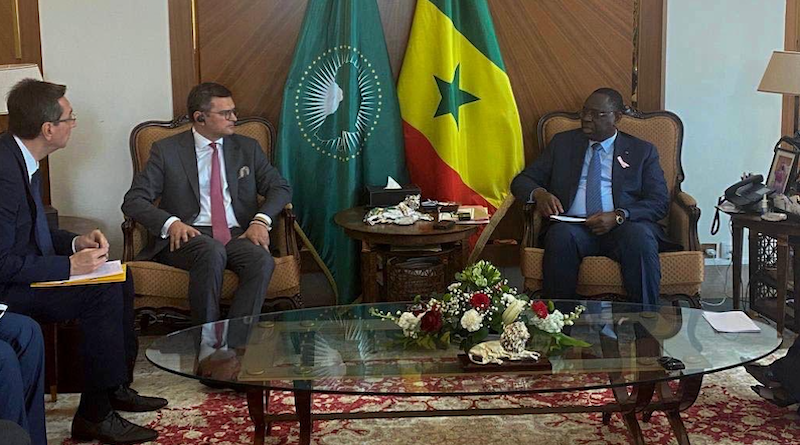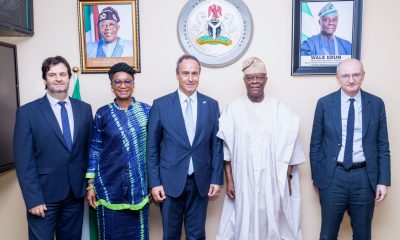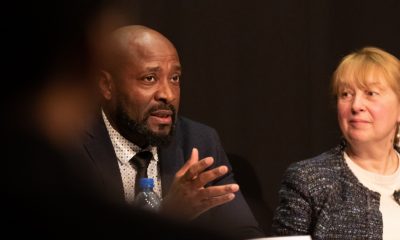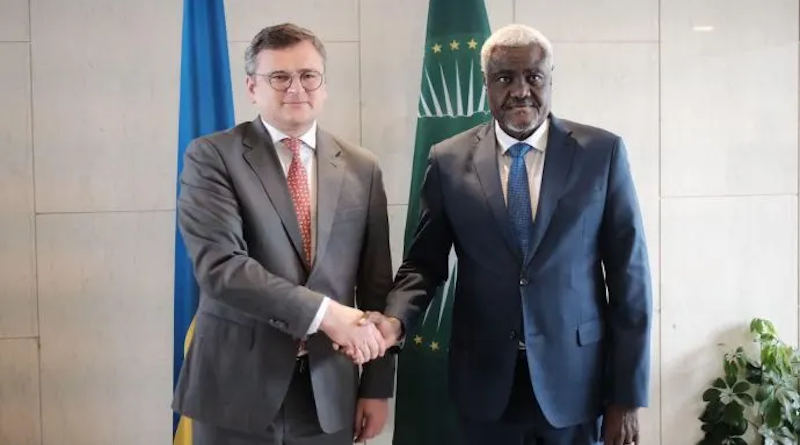World
Ukraine, Africa to Bolster Economic Cooperation

By Kestér Kenn Klomegâh
Despite the former Soviet republic of Ukraine, for almost a year, is experiencing the worst times due to an extensive special military operation from its neighbour Russia, it has simultaneously been stepping up efforts to support Africa. During the past year, it despatched tonnes of fertilizers, wheat, grains and other agricultural products to a number of African countries, most of them located in the Horn and East Africa.
In order to boost its efforts in establishing cordial working relations, especially in the area of economic cooperation, Ukrainian Foreign Ministry Dmitry Kuleba last year visited a number of African countries, held useful conversations with high-powered government officials, and plans to open diplomatic representative offices this year inside Africa. It also plans to boost exports and participate in taking up opportunities for manufacturing offered by the single continental market.
The overarching message in all these is to focus on engaging and expanding the expected long-term partnership and collaboratively establishing trade links. For connecting business interests between Ukraine and Africa, Ukrainians are rapidly studying more possibilities for participating in the African Continental Free Trade Area, which was already agreed on, in the process, with a number of African leaders and the African Union.
In early January, Ukrainian Agrarian Policy and Food Minister Nikolai Solsky visited Senegal, where he signed a memorandum of understanding between the Ukrainian ministry and the relevant Senegalese agency on January 9, the Agrarian Policy and Food Ministry website.
The document envisions the development of bilateral trade in agricultural produce and cooperation on scientific studies, investments, and interrelations between Ukrainian and Senegalese government agencies and private companies. It provides for the possible storage of Ukrainian grain at so-called grain hubs. Ukraine is willing to export not only foodstuffs but also other goods to African countries, which requires the development of logistical infrastructure.
The official document points out that Ukraine is considering the implementation of new logistical projects in Senegal to step up exports of its agricultural produce via the Port of Dakar. The west African republic of Ghana plans to implement new logistics projects, which will help increase agricultural exports from Ukraine. Ukrainian Agrarian Policy and Food Minister Nikolai Solsky and Ghana’s Minister of Food and Agriculture, Owusu Afriyie Akot, have thoroughly discussed steps to broaden agricultural cooperation and trade relations.
The parties discussed a potential joint project, a logistics hub that will be able to store food products, including grain, and will help stabilize food prices in the region. Besides Ghana and Senegal, Nigeria has also expressed high interest in setting up such hubs in its territory. The current geopolitical situation should rather have a reliable and diversified transit and transport infrastructure to destinations where it is badly needed, especially naturally disaster-affected regions in Africa.
“There have been meetings in Ghana, Senegal, and Nigeria. These countries regularly take a lot of food products, especially wheat. These are major markets from the standpoint of their populations compared to the European market or many other countries. It doesn’t have much purchasing power, but it is big and is developing, and therefore, it needs to be monitored,” Ukrainian media quoted Solsky as saying.
Solsky said each country he had visited was interested in developing cooperation with Ukraine and ready to expand the capacity of their ports to increase the volume of Ukrainian grain unloaded and stored there. But, before launching the construction of hubs in Africa to transship Ukrainian grain, Ukraine needs to receive guarantees from the countries concerned, including documenting the guarantees and the principles of operating them either by Ukraine, or whether it will be a state company, and how private traders will be involved in this cooperation.
Solsky said that his ministry would provide more information about infrastructure projects in mid-spring 2023, as in the coming months, it would have to hold additional consultations with the authorities of African countries and businesses interested in Ukrainian grain exports to Africa.
Within the framework of the roadmap, it has launched its development projects, including constructing facilities for the storage of agricultural foodstuffs and for onward distribution throughout some regional markets to offset food shortages in Africa. Ukraine, however, insists that the food and fertilizer trade should not be subjected to sanctions or any restrictions.
According to several reports carefully monitored by this author, President Volodymyr Zelensky held 18 conversations with African leaders in 2022, nine of which were the first instances of bilateral communication between Ukraine and these African countries. Ukrainian Foreign Ministry listed some of them, such as Ghana, Guinea-Bissau, Democratic Republic of Congo, Zambia, Ivory Coast, Malawi, Mozambique, Niger, and Botswana.
President of Guinea-Bissau and Chairperson-in-Office of the Economic Community of West Africa Umaro Embalo visited Ukraine in October 2022. It was the first official visit by a leader of a sub-Saharan African state since 2004, according to the Ukrainian Foreign Ministry.
Ukrainian Foreign Ministry Dmitry Kuleba, for his part, held 35 phone calls and meetings with his counterparts from African countries in 2022, the ministry said. The first-ever African tour by a Ukrainian foreign minister took place in October 2022. The report indicated that Minister Kuleba visited Senegal, Ivory Coast, Ghana, and Kenya.
Ukraine’s Special Representative for the Middle East and Africa, Maxim Subkh, appointed in July 2022, also visited five African countries. Within this emerging multipolar world, Ukraine is broadening its geopolitical influence, and of course, it is important for Ukraine to fix its diplomatic presence on the continent to an appreciable level necessary for active interaction, in a continuous and efficient manner, with Africa. It has official representation, an observer status, at the African Union.
Arriving back in Kyiv after his visit to Washington in December, President Volodymyr Zelensky, in a video address, announced that Ukraine would open 10 new embassies in African countries.
“We are rebooting relationships with dozens of countries in Africa. We must strengthen this as we have already determined ten countries where new Ukrainian embassies in Africa will be opened. We have also developed a concept of the Ukraine-Africa Trade House. Its offices will open in the capitals of the most promising countries of the continent,” he said.
President Zelenskiy considers Africa as a unique and dynamically developing continent with whom to have relations. In addition, these countries are steadily gaining political weight and achieving significant economic successes, it, therefore, becomes necessary to look for more new partners, eventually targeting African countries.
The Chairman of the African Union and President of Senegal, Macky Sall, together with the Chairperson of the African Union Commission, Moussa Faki Mahamat, visited Moscow and Kyiv in an attempt to mediate the conflict, but without any result in sight.
“We do not want to be aligned on this conflict, very clearly, we want peace. Even though we condemn the invasion, we’re working for a de-escalation, we’re working for a ceasefire, for dialogue … that is the African position,” Senegalese Macky Sall said back in May 2022.
Meanwhile, Africa is still divided over the crisis between Russia and Ukraine, the crisis that has caused global economic instability since February 24, 2022. The African Union (AU) and African leaders understand aspects of the geopolitical complexities, implications and possible solutions to the existing conflict between Russia and Ukraine.
World
African Visual Art is Distinguished by Colour Expression, Dynamic Form—Kalalb

By Kestér Kenn Klomegâh
In this insightful interview, Natali Kalalb, founder of NAtali KAlalb Art Gallery, discusses her practical experiences of handling Africa’s contemporary arts, her professional journey into the creative industry and entrepreneurship, and also strategies of building cultural partnership as a foundation for Russian-African bilateral relations. Here are the interview excerpts:
Given your experience working with Africa, particularly in promoting contemporary art, how would you assess its impact on Russian-African relations?
Interestingly, my professional journey in Africa began with the work “Afroprima.” It depicted a dark-skinned ballerina, combining African dance and the Russian academic ballet tradition. This painting became a symbol of cultural synthesis—not opposition, but dialogue.
Contemporary African art is rapidly strengthening its place in the world. By 2017, the market was growing so rapidly that Sotheby launched its first separate African auction, bringing together 100 lots from 60 artists from 14 foreign countries, including Algeria, Ghana, Mali, Nigeria, Senegal, and others. That same year during the Autumn season, Louis Vuitton Foundation in Paris hosted a major exhibition dedicated to African art. According to Artnet, sales of contemporary African artists reached $40 million by 2021, a 434% increase in just two years. Today, Sotheby holds African auctions twice a year, and in October 2023, they raised $2.8 million.
In Russia, this process manifests itself through cultural dialogue: exhibitions, studios, and educational initiatives create a space of trust and mutual respect, shaping the understanding of contemporary African art at the local level.
Do you think geopolitical changes are affecting your professional work? What prompted you to create an African art studio?
The international context certainly influences cultural processes. However, my decision to work with African themes was not situational. I was drawn to the expressiveness of African visual language—colour, rhythm, and plastic energy. This theme is practically not represented systematically and professionally in the Russian art scene.
The creation of the studio was a step toward establishing a sustainable platform for cultural exchange and artistic dialogue, where the works of African artists are perceived as a full-fledged part of the global cultural process, rather than an exotic one.
To what extent does African art influence Russian perceptions?
Contemporary African art is gradually changing the perception of the continent. While previously viewed superficially or stereotypically, today viewers are confronted with the depth of artistic expression and the intellectual and aesthetic level of contemporary artists.
Portraits are particularly impactful: they allow us to see not just an abstract image of a “continent,” but a concrete personality, character, and inner dignity. Global market growth data and regular auctions create additional trust in African contemporary art and contribute to its perception as a mature and valuable movement.
Does African art reflect lifestyle and fashion? How does it differ from Russian art?
African art, in my opinion, is at its peak in everyday culture—textiles, ornamentation, bodily movement, rhythm. It interacts organically with fashion, music, interior design, and the urban environment. The Russian artistic tradition is historically more academic and philosophical. African visual art is distinguished by greater colour expression and dynamic form. Nevertheless, both cultures are united by a profound symbolic and spiritual component.
What feedback do you receive on social media?
Audience reactions are generally constructive and engaging. Viewers ask questions about cultural codes, symbolism, and the choice of subjects. The digital environment allows for a diversity of opinions, but a conscious interest and a willingness to engage in cultural dialogue are emerging.
What are the key challenges and achievements of recent years?
Key challenges:
- Limited expert base on African contemporary art in Russia;
- Need for systematic educational outreach;
- Overcoming the perception of African art as exclusively decorative or ethnic.
Key achievements:
- Building a sustainable audience;
- Implementing exhibition and studio projects;
- Strengthening professional cultural interaction and trust in African
contemporary art as a serious artistic movement.
What are your future prospects in the context of cultural diplomacy?
Looking forward, I see the development of joint exhibitions, educational programs, and creative residencies. Cultural diplomacy is a long-term process based on respect and professionalism. If an artistic image is capable of uniting different cultural traditions in a single visual space, it becomes a tool for mutual understanding.
World
Ukraine Reveals Identities of Nigerians Killed Fighting for Russia

By Adedapo Adesanya
The Ukrainian Defence Intelligence (UDI) has identified two Nigerian men, Mr Hamzat Kazeem Kolawole and Mr Mbah Stephen Udoka, allegedly killed while fighting as Russian mercenaries in the war between the two countries ongoing since February 2022.
The development comes after Russia denied knowledge of Nigerians being recruited to fight on the frontlines.
Earlier this week, the Russian Ambassador to Nigeria, Mr Andrey Podyolyshev, said in Abuja that he was not aware of any government-backed programme to recruit Nigerians to fight in the war in Ukraine.
He said if at all such activity existed, it is not connected with the Russian state.
However, in a statement on Thursday, the Ukrainian Defence released photographs of Nigerians killed while defending Russia.
“In the Luhansk region, military intelligence operatives discovered the bodies of two citizens of the Federal Republic of Nigeria — Hamzat Kazeen Kolawole (03.04.1983) and Mbah Stephen Udoka (07.01.1988),” the statement read.
According to the statement, both men served in the 423rd Guards Motor Rifle Regiment (military unit 91701) of the 4th Guards Kantemirovskaya Tank Division of the armed forces of the Russian Federation.
UDI said that they signed contracts with the Russian Army in the second half of 2025 – the deceased Mr Kolawole on August 29 and Mr Udoka on September 28.
“Udoka received no training whatsoever — just five days later, on October 3, he was assigned to the unit and sent to the temporarily occupied territories of Ukraine,” the report read.
It added that no training records for Mr Kolawole have been preserved; however, it is highly likely that he also received no military training, but his wife and three children remain in Nigeria.
Both Nigerians, the report added, were killed in late November during an attempt to storm Ukrainian positions in the Luhansk region.
“They never engaged in a firefight — the mercenaries were eliminated by a drone strike,” UDI stated, warning foreign citizens against travelling to the Russian Federation or taking up any work on the territory of the “aggressor state”.
“A trip to Russia is a real risk of being forced into a suicide assault unit and, ultimately, rotting in Ukrainian soil,” the statement read.
In an investigation earlier this month, CNN reported that hundreds of African men have been enticed to fight for Russia in Ukraine with the promise of civilian jobs and high salaries. However, the media organisation uncovered that they are being deceived or sent to the front lines with little combat training.
CNN said it reviewed hundreds of chats on messaging apps, military contracts, visas, flights and hotel bookings, as well as gathering first-hand accounts from African fighters in Ukraine, to understand just how Russia entices African men to bolster its ranks.
World
Today’s Generation of Entrepreneurs Value Flexibility, Autonomy—McNeal-Weary

By Kestér Kenn Klomegâh
The Young African Leaders Initiative (YALI) is the United States’ signature step to invest in the next generation of African leaders. Since its establishment in 2010 by Obama administration, YALI has offered diverse opportunities, including academic training in leadership, governance skills, organizational development and entrepreneurship, and has connected with thousands of young leaders across Africa. This United States’ policy collaboration benefits both America and Africa by creating stronger partnerships, enhancing mutual prosperity, and ensuring a more stable environment.
In our conversation, Tonya McNeal-Weary, Managing Director at IBS Global Consulting, Inc., Global Headquarters in Detroit, Michigan, has endeavored to discuss, thoroughly, today’s generation of entrepreneurs and also building partnerships as a foundation for driving positive change and innovation in the global marketplace. Here are the excerpts of her conversation:
How would you describe today’s generation of entrepreneurs?
I would describe today’s generation of entrepreneurs as having a digital-first mindset and a fundamental belief that business success and social impact can coexist. Unlike the entrepreneurs before them, they’ve grown up with the internet as a given, enabling them to build global businesses from their laptops and think beyond geographic constraints from day one. They value flexibility and autonomy, often rejecting traditional corporate ladders in favor of building something meaningful on their own terms, even if it means embracing uncertainty and financial risk that previous generations might have avoided.
And those representing the Young African Leaders Initiative, who attended your webinar presentation late January 2026?
The entrepreneurs representing the Young African Leaders Initiative are redefining entrepreneurship on the continent by leveraging their unique perspectives, cultural heritage, and experiences. Their ability to innovate within local contexts while connecting to global opportunities exemplifies how the new wave of entrepreneurs is not confined by geography or conventional expectations.
What were the main issues that formed your ‘lecture’ with them, Young African Leaders Initiative?
The main issues that formed my lecture for the Young African Leaders Initiative were driven by understanding the importance of building successful partnerships when expanding into the United States or any foreign market. During my lecture, I emphasized that forming strategic alliances can help entrepreneurs navigate unfamiliar business environments, access new resources, and foster long-term growth. By understanding how to establish strong and effective partnerships, emerging leaders can position their businesses for sustainable success in global markets. I also discussed the critical factors that contribute to successful partnerships, such as establishing clear communication channels, aligning on shared goals, and cultivating trust between all parties involved. Entrepreneurs must be proactive in seeking out partners who complement their strengths and fill gaps in expertise or resources. It is equally important to conduct thorough due diligence to ensure that potential collaborators share similar values and ethical standards. Ultimately, the seminar aimed to empower YALI entrepreneurs with practical insights and actionable strategies for forging meaningful connections across borders. Building successful partnerships is not only a pathway to business growth but also a foundation for driving positive change and innovation in the global marketplace.
What makes a ‘leader’ today, particularly, in the context of the emerging global business architecture?
In my opinion, a leader in today’s emerging global business architecture must navigate complexity and ambiguity with a fundamentally different skill set than what was previously required. Where traditional leadership emphasized command-and-control and singular vision, contemporary leaders succeed through adaptive thinking and collaborative influence across decentralized networks. Furthermore, emotional intelligence has evolved from a soft skill to a strategic imperative. Today, the effective modern leader must possess deep cross-cultural intelligence, understanding that global business is no longer about exporting one model worldwide but about genuinely integrating diverse perspectives and adapting to local contexts while maintaining coherent values.
Does multinational culture play in its (leadership) formation?
I believe multinational culture plays a profound and arguably essential role in forming the kind of leadership required in today’s global business environment. Leaders who have lived, worked, or deeply engaged across multiple cultural contexts develop a cognitive flexibility that’s difficult to replicate through reading or training alone. More importantly, multinational exposure tends to dismantle the unconscious certainty that one’s own way of doing things is inherently “normal” or “best.” Leaders shaped in multicultural environments often develop a productive discomfort with absolutes; they become more adept at asking questions, seeking input, and recognizing blind spots. This humility and curiosity become strategic assets when building global teams, entering new markets, or navigating geopolitical complexity. However, it’s worth noting that multinational experience alone doesn’t automatically create great leaders. What matters is the depth and quality of cross-cultural engagement, not just the passport stamps. The formation of global leadership is less about where someone has been and more about whether they’ve developed the capacity to see beyond their own cultural lens and genuinely value differences as a source of insight rather than merely tolerating them as an obstacle to overcome.
In the context of heightening geopolitical situation, and with Africa, what would you say, in terms of, people-to-people interaction?
People-to-people interaction is critically important in the African business context, particularly as geopolitical competition intensifies on the continent. In this crowded and often transactional landscape, the depth and authenticity of human relationships can determine whether a business venture succeeds or fails. I spoke on this during my presentation. When business leaders take the time for face-to-face meetings, invest in understanding local priorities rather than imposing external agendas, and build relationships beyond the immediate transaction, they signal a different kind of partnership. The heightened geopolitical situation actually makes this human dimension more vital, not less. As competition increases and narratives clash about whose model of development is best, the businesses and nations that succeed in Africa will likely be those that invest in relationships characterized by reciprocity, respect, and long-term commitment rather than those pursuing quick wins.
How important is it for creating public perception and approach to today’s business?
Interaction between individuals is crucial for shaping public perception, as it influences views in ways that formal communications cannot. We live in a society where word-of-mouth, community networks, and social trust areincredibly important. As a result, a business leader’s behavior in personal interactions, their respect for local customs, their willingness to listen, and their follow-through on commitments have a far-reaching impact that extends well beyond the immediate meeting. The geopolitical dimension amplifies this importance because African nations now have choices. They’re no longer dependent on any single partner and can compare approaches to business.
From the above discussions, how would you describe global business in relation to Africa? Is it directed at creating diverse import dependency?
While it would be too simplistic to say global business is uniformly directed at creating import dependency, the structural patterns that have emerged often produce exactly that outcome, whether by design or as a consequence of how global capital seeks returns. Global financial institutions and trade agreements have historically encouraged African nations to focus on their “comparative advantages” in primary commodities rather than industrial development. The critical question is whether global business can engage with Africa in ways that build productive capacity, transfer technology, develop local talent, and enable countries to manufacture for themselves and for export—or whether the economic incentives and power irregularities make this structurally unlikely without deliberate policy intervention.
-

 Feature/OPED6 years ago
Feature/OPED6 years agoDavos was Different this year
-
Travel/Tourism10 years ago
Lagos Seals Western Lodge Hotel In Ikorodu
-

 Showbiz3 years ago
Showbiz3 years agoEstranged Lover Releases Videos of Empress Njamah Bathing
-

 Banking8 years ago
Banking8 years agoSort Codes of GTBank Branches in Nigeria
-

 Economy3 years ago
Economy3 years agoSubsidy Removal: CNG at N130 Per Litre Cheaper Than Petrol—IPMAN
-

 Banking3 years ago
Banking3 years agoSort Codes of UBA Branches in Nigeria
-

 Banking3 years ago
Banking3 years agoFirst Bank Announces Planned Downtime
-

 Sports3 years ago
Sports3 years agoHighest Paid Nigerian Footballer – How Much Do Nigerian Footballers Earn





















